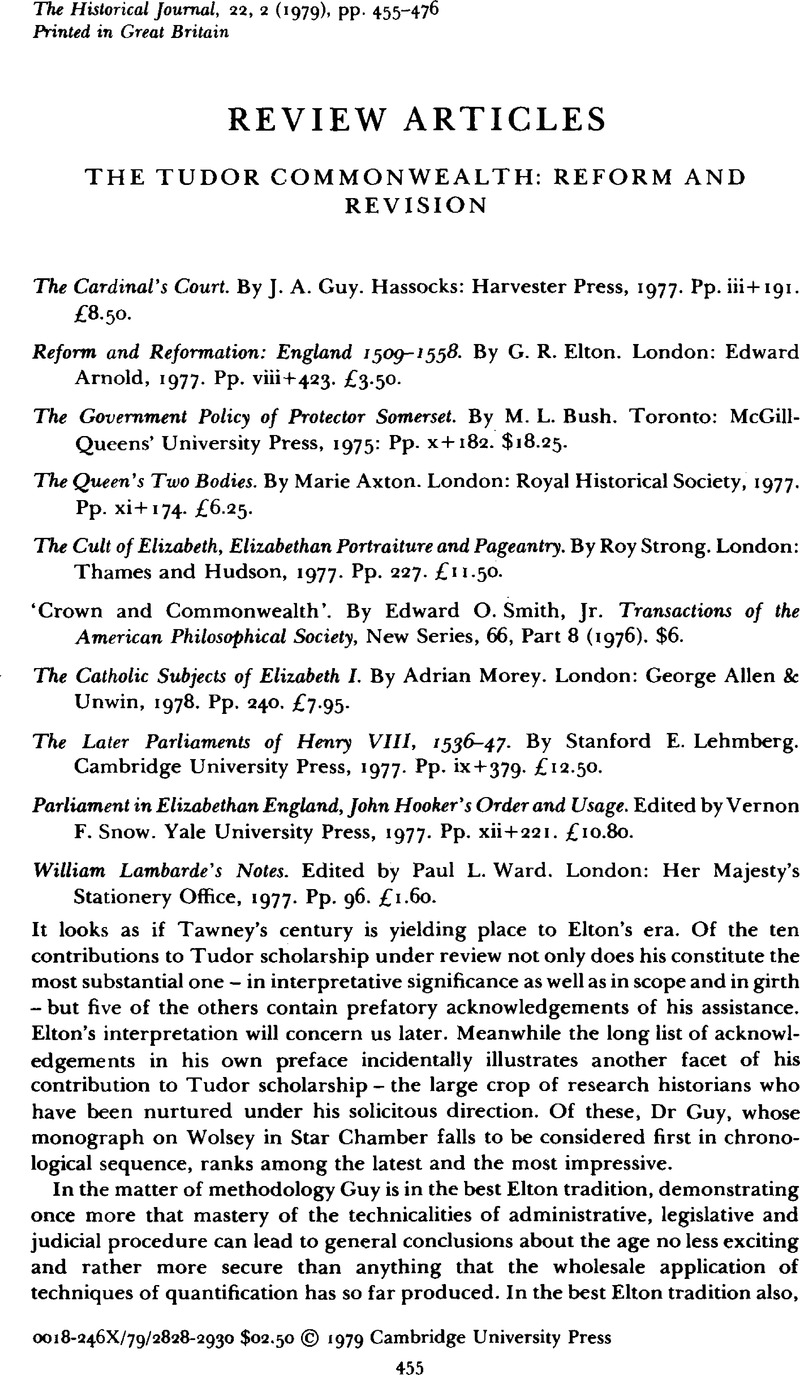Published online by Cambridge University Press: 11 February 2009

1 Scarisbrick, J. J., Henry VIII (London, 1971), pp. 98–134Google Scholar.
2 Scarisbrick, J. J., ‘Cardinal Wolsey and the Common Weal’, in Wealth and power in Tudor England, ed. Ives, E. W. et al. (London, 1978), pp. 45–67Google Scholar.
3 Cavendish, George, The life and death of Cardinal Wolsey, ed. Sylvester, R. S. (London, 1953) pp. 117–18Google Scholar.
4 Thomas, G. W., ‘James I, equity and Lord Keeper John Williams’, English Historical Review, XCI (1976), 506–28CrossRefGoogle Scholar.
5 Scarisbrick, ‘Cardinal Wolsey and the Common Weal’, p. 64.
6 Guy, The Cardinal's Court, pp. 103, 125.
7 Elton, Reform and Reformation, p. 323.
8 Ibid. p. 201.
9 Ibid. p. 172
10 Elton, , ‘The political ideas of Thomas Cromwell’, Studies in Tudor and Stuart government and politics (2 vols., Cambridge, 1976), II, 215–35Google Scholar.
11 Bradshaw, Brendan, The Irish constitutional revolution of the sixteenth century (Cambridge, 1979), pp. 146–54CrossRefGoogle Scholar.
12 Cf. Bowker, Margaret, ‘The supremacy and the episcopate, the struggle for control, 1534–40’, Historical Journal, XVIII (1975), 227–43CrossRefGoogle Scholar.
13 Bradshaw, The Irish constitutional revolution, pp. 58–66.
14 The evidence in this connexion seems ambiguous. For instance, on the occasion of Charles V's visit to England in 1521 the imperial theme was prominent in the pageantry addressed to Charles but was not present in that addressed to the English monarch. Anglo, Sydney, Spectacle, pageantry and early Tudor policy (Oxford, 1969), p. 195Google Scholar.
15 Bradshaw, The Irish constitutional revolution, pp. 233–44.
16 Elton, Reform and Reformation, pp. 15–16.
17 Elton, , ‘Thomas More's Tower works’, English Historical Review, XCIII (1978), 399–404CrossRefGoogle Scholar.
18 Reform and Reformation, pp. 42–7.
19 On this see Plato's remarks in The Laws with reference to The Republic, Laws, v, 739.
20 Elton, Reform and Reformation, pp. 320–5.
21 Ibid. pp. 224–5. Elton, , Reform and renewal (Cambridge, 1973), pp. 112–15Google Scholar.
22 Elton, Reform and Reformation, pp. 225–6. Idem, ‘An early Tudor poor law’, Economic History Review, 11 (1953), 55–67.
23 Statutes of the Realm (London, 1817), III, 328Google Scholar.
24 Elton, Reform and Reformation, pp. 225–6.
25 Elton, Reform and renewal, p. 33.
26 Extended excerpts are published in England in the reign of Henry VIII, ed. Herrtage, S. J. (London, E.E.T.S., 1878), x, xlviii–lxiiiGoogle Scholar.
27 Elton, Reform and Reformation, p. 246.
28 Ibid. p. 284.
28 Ibid. p. 291.
30 Elton, Reform and renewal, pp. 48–55.
31 Bush, Protector Somerset, p. 54.
32 Statutes of the Realm (London, 1819), IV, 5–9Google Scholar.
33 Davies, C. S. L., ‘Slavery and Protector Somerset’, Economic History Review, XIX (1966), 533–49CrossRefGoogle Scholar.
34 An epistle from Calvin to the duke of Somerset (London, 1550).
35 Kearney, Hugh, Scholars and gentlemen (London, 1970), pp. 34–5Google Scholar.
36 SirElyot, Thomas, The boke named the Governour, ed. Croft, H. H. S. (London, 1880), pp. 1 ffGoogle Scholar.
37 SirSmith, Thomas, De Republican Anglorum, ed. Alston, L. (Cambridge, 1906)Google Scholar.
38 Bush, Protector Somerset, p. 83. The one area in which Dr Bush conceded originality to Somerset was in his Irish policy. Relying on a pioneering study of government policy in Edwardian Ireland, he traced the beginnings of the policy of conquest to Somerset's period. Somerset must be denied this doubtful distinction. The work on which Dr Bush relied has now been superseded. See Canny, Nicholas P., The Elizabethan conquest of Ireland (Hassocks, 1976), pp. 29–44Google Scholar; Bradshaw, The Irish constitutional revolution, pp. 258–63.
39 Yates, Frances, Astraea (Harmondsworth, 1977 edn), pp. 29–87Google Scholar.
40 Burgoyne, F. J. (ed.), Leycesters Commonwealth (London, 1904)Google Scholar, passim.
41 Morey, Catholic subjects, p. 90.
42 G. R. Elton, ‘Studying the history of parliament’, Studies, 11, 3–21.
43 Bradshaw, , ‘The beginning of modern Ireland’, The Irish parliamentary tradition, ed. Farrell, Brian (Dublin, 1973), pp. 68–87Google Scholar.